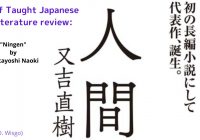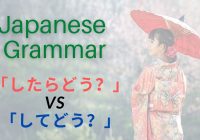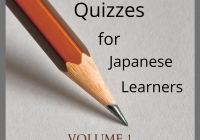Category Archives: Japanese Study: Advanced
The patterns “shite dou?” / “shitara dou?” and vagueness with verb tenses in Japanese
Compared to other languages, such as English and Spanish, Japanese has a fairly small number of verb tenses. So it’s not much of a surprise that some of the tenses have many different uses, and often do not give much information as to when an action happened. In this post I’d like to talk about… Read More »
Multiple Meanings of “Maru” in Japanese (円、丸)
It’s not uncommon for one word in a language to have multiple meanings, but for non-native learners it can be challenge to figure out all the meanings from context. Japanese is no exception, although intonation (depending on region) and kanji selection can help to differentiate meanings in some cases. In this post I want to… Read More »
Japanese expression: とんだとばっちりを食う (tonda tobacchiri wo kuu)
In this post I’d like to go over the expression “とんだとばっちりを食う” (tonda tobacchiri wo kuu) which can be a little tricky to understand. Before talking about the overall meaning I want to look at each of the components. With the exception of children’s books, written Japanese generally does not have spaces between the words. Having… Read More »
Japanese literary expression: ~言わんばかり (~iwan bakari)
One of the joys of reading Japanese literature is that the more you do it, the more you pick up certain words and phrases that are specific to literature and not commonly used in spoken language. This knowledge helps you not just understand the meaning of such words but also their nuances. In this post… Read More »
Japanese literature review: “The Legend of Fukiage: Book 1″ (吹上奇譚 第一話) by Banana Yoshimoto (吉本バナナ)
Banana Yoshimoto is one of the most well-known Japanese authors in the Western world, with over 10 novels translated into English. Because I generally try to read, review, and translate authors which are not yet very well known in the West, it might seem odd that I choose to read and review one of her… Read More »
The Language Corrector’s Dilemma
When studying a foreign language, it’s common to ask a native speaker to correct your spoken or written language, which often involves determining what sort of phrasing sounds natural and correct. Similarly, as a native or at least semi-fluent speaker of some language, you can get into situations where you are answering such questions, or… Read More »
Japanese particle combination: からの (kara no)
As you probably know, particles are little words that help give grammatical context to other words in Japanese and are critically important for proper grammar (and in some ways are similar to articles and prepositions in English). Particles can be used on their own, as well as in limited combinations with other particles, and in… Read More »
Book Release: Japanese Particle Quizzes [Yaba-Q: Volume 1]
(quick link to my new particle quiz book on Amazon) For anyone who has followed this blog you probably know that in the last few years I’ve started putting out eBooks with my translations of various pieces of Japanese literature. A few of these are in parallel Japanese / English to help those studying Japanese,… Read More »
Use active reading to boost your foreign language skills
Sometime during my high school years, I remember being shocked to discover that a friend could understand Spanish, and yet barely speak it herself. While I’ve since accepted that passive activities (listening and reading) are quite different from active ones (speaking and writing), even now it’s still a little mysterious to me. One way to… Read More »









